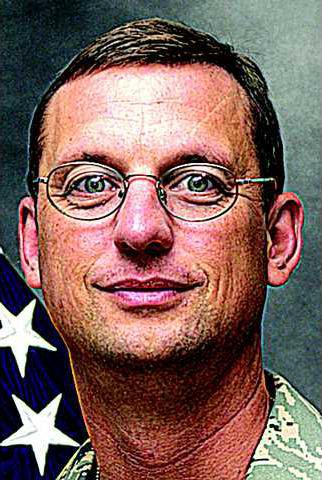Editor’s note: State Rep. Doug Collins, R-Gainesville, currently is in Iraq as a U.S. Air Force Reserve chaplain. He began his service in September. He is reporting weekly on the activities at his location.
In the days leading up to my trip over here, I was often asked what exactly a chaplain does in Iraq. I usually would say that I take care of the troops and perform services. That was the best I could do in order for people to understand what we do as chaplains. After being over here for about a month and a half, I want to try to answer the question about what a chaplain does here in Iraq.
The best way I can describe my work is that I am a communication officer. I spend my days, or nights in my case, talking to the wonderful men and women who are sent over here to perform a difficult job under the constant threat that they may never make it back home to the people they care about.It is not something that is talked about, but it is always on people’s minds. And yet they perform their jobs in an amazing manner that insures that our mission is complete each and every day. It is in the midst of these conversations that a chaplain performs his work.
My job is to help people talk about things here and back home, all with the purpose of keeping them ready to do their job.
I view what I do as making sure the troops here are mentally ready to do the mission and mentally prepared to go home after it is all said and done. I have a communications job.
In making sure they are ready, I talk with them about the things in life that matter most to them. For some of my younger single folks, they are always talking about friends back home and what they want to do with their life after they get back home from Iraq. The thought process in most is never more than a year or two down the road.
Many of them are away from home for the first time, and they miss the things that had nurtured them when they were growing up. I am amazed at how many of my folks are less than 18 months out of high school.
How does a 42-year-old chaplain connect with these young folks? By listening and sharing ideas that will help them see beyond the moment and into what I believe will be a great future for them. Sometimes I get the same look that my kids give me, but other times you can see that they get it, and as I leave I know that they are ready to do the job both physically and mentally.
Many times, however, my conversations are about problems and worries that work to distract them from their job. I view these moments as the most critical in my ministry here.
The older troops often think of their families and careers, and on that level we have a lot in common.
You see, if their minds are not right, they could fail to perform and put not only themselves in harm’s way, but others as well. We all live dependently on each other here, each with an important job to do. In these cases, I try everything I can to get their mind back on track and then sometimes plan a time for later to discuss in more depth the problems they are facing.
It is these times that I also use my communication line as a chaplain — prayer. I will pray with folks or pray for them after they leave if it was not appropriate at the time. I know that my strength alone is not enough for them, and I call on help.
One of the great things that I am privileged to share with my folks is another form of communication — their letters, notes and packages from home.
Everyone has something special that they do with notes from home. I keep all the letters that my wife sends me in a pocket on the inside of my uniform blouse over my heart. I like to think that she is right there whenever I am out and about. My kids’ notes get put up in my room to remind me of the joy they bring.
I am not alone in holding on to pieces of paper. I have seen them kept in hats, helmets, pockets and pouches. The one place they are all kept is in our hearts. It is the communication we have with those back home that keeps us all going and provides more than a chaplain can provide.
So, if you were to ask me today what do I do as a chaplain over here, I would tell you that I am a communication officer. Before some of you get concerned, I still preach every Wednesday night and conduct three Bible studies. But I have to say that I believe God has used me to communicate care and concern more in the offices, guard towers and in the work spaces than anywhere else. May you have a great week and thanks for your communications and prayers.

